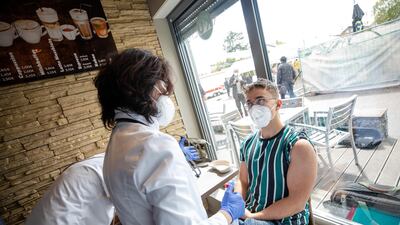Germany will allow AstraZeneca's Covid-19 vaccine to be given to adults of all ages, reversing a previous decision that restricted it to people over 60 years.
Germany is doing away with limiting AstraZeneca shots to priority groups and will instead make it available immediately to all over-18s, Health Minister Jens Spahn said.
He also said Germany aimed to offer those aged 12 to 18 a vaccine by the end of August, provided regulators give approval for the Pfizer/ BioNTech shot for that age group.
Millions of doses of the AstraZeneca vaccine have been safely administered in Europe, but concerns linger over a rare type of blood clot seen in an extremely small number of recipients, meaning that some people in early priority groups due to their age or pre-existing health conditions have been holding off on receiving it, preferring to wait for another vaccine.
Health authorities have said the benefits of being inoculated against Covid-19 far outweigh any risks and Mr Spahn said many people still waiting for an appointment for their first shot would be happy to receive the AstraZeneca vaccine.
Therefore, the government decided to allow doctors’ offices to vaccinate any adults for whom it is deemed appropriate, he said.
He suggested some people may have been deterred by the wait time between AstraZeneca shots – currently 12 weeks in Germany, compared to half that for the Pfizer/ BioNTech shot, which is the most popular in the country.
AstraZeneca's own guidance is that the second shot can be given between four to 12 weeks after the first, however Mr Spahn said the government would now leave it "in the hands of the doctors" to decide when to give the second vaccination.
He said: "That means doctors will decide who should be vaccinated, according to their medical judgment.
"They will decide with the person to be vaccinated which vaccine should be used and whether AstraZeneca is the right one."
Some German states, including Berlin, Bavaria, Mecklenburg-Western Pomerania and Saxony, already allow over-18s to have the AstraZeneca vaccine.
Mr Spahn had been pushing all 16 states to agree that anyone over 18 can receive the shot.
The AstraZeneca vaccine has been dogged by controversy, including failure to hit delivery targets and concerns over side effects.
There has been scrutiny of the AstraZeneca vaccine on the issue of very rare clots, with a higher incidence in younger people. Some countries, including Britain, have recommended that only people over a certain age receive the shot.
Britain's medicine regulator said there was some evidence that uncommon blood clots linked to AstraZeneca's vaccine occurred more in women than in men and added that the difference in incidence was small.
The German vaccine programme was much criticised for its slow start but has dramatically picked up pace, with 15 million shots given in April, as many as in the three previous months combined, Mr Spahn said.
Parts of Germany are eyeing a loosening of lockdown restrictions as the number of new cases fell nationwide on Wednesday, although infection rates remain high in some of the 16 federal states.
Confirmed new coronavirus cases in Germany rose on Wednesday by 18,034 to 3,451,550, but that 24-hour figure was 4,000 lower than a week ago and the seven-day incidence per 100,000 people dropped to 132 from 141 on Tuesday, the lowest in three weeks.
Legislation passed last month enabled the federal government to impose night-time curfews in areas where cases exceed 100 per 100,000 residents on three consecutive days, and even stricter curbs where cases go above 165 per 100,000.
Some states have said they will begin easing restrictions on outdoor dining, tourism and retail if case incidence rates fall below 100.
On Tuesday, Germany's Cabinet agreed to ease restrictions on people who are fully vaccinated or have recovered from Covid-19, a decree which could come into effect at the weekend.


